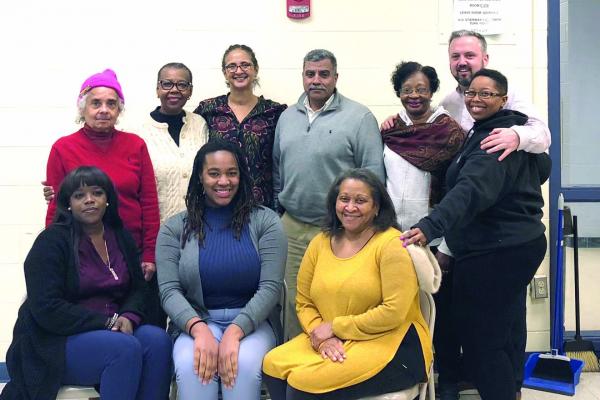March 7, 2019

The newly elected Greater Mattapan Neighborhood Council board. Front Row (l-r): assistant treasurer Mirlande Joseph, vice chair Janae Tooley, treasurer Vickey Siggers. Back Row (l-r): outreach committee chair Lenore Pereira, housing and development committee chair June Joseph, board chair and community benefits committee chair Fatima Ali-Salaam, zoning committee chair David Lopes, Ruby James Saucer, secretary Matthew Skelly, Nichelle Nicole Purvis-Donnell. Board member Cynthia Beckford-Brewington is not shown.
Almost 150 Mattapan residents cast ballots in late February to begin filling out the leadership bench for a newly-formed neighborhood council. Now with 11 of a maximum 21 board seats filled, the Greater Mattapan Neighborhood Council is already starting to organize its committees and turn its eye to oncoming development.
Fatima Ali-Salaam, chair of the council, sees the community group as a necessary part of the ever-evolving Boston civic ecosystem.
“Mattapan is part of the city of Boston, and if the term One Boston is to mean anything, you have to start acting like it,” she said. The formation of this elected organization “should not be viewed as a negative,” she said. “It should be viewed as a positive because we are supporting existing organizations that for the most part are headed by people in the community.”
Neighborhood councils are still somewhat of a rarity in Boston, dating back to the 1980s under then-mayor Raymond Flynn. The handful of prior councils include those in the North End/Waterfront, Roxbury, Codman Square, Chinatown, and Jamaica Plain, the latter of which is still extremely active.
The council structure differs from that of a normal civic group. Their reach is wider and their election more formalized, serving as an umbrella organization focused on larger development concerns and neighborhood priorities, offering support to existing smaller organizations and speaking with a stronger voice in city processes. Ali-Salaam estimates around 30 to 40 other neighborhood groups fall within the neighborhood council boundaries.
After 147 valid ballots were cast on Feb. 23, an independent election committee tallied the votes. Only Mattapan residents over 16 who are not stakeholders in some sort of existing business, elected post, or non-profit could be elected to the leadership board, though they may still join as members.
Ali-Salaam received 93 votes and was elected chair. The board determined the other officers and committee assignments on Feb. 26. Additional midterm elections will take place later, to begin filling out the leadership bench, Ali-Salaam said, with the same rules as the first election. The full council will consist of 21 members made up of five from smaller Mattapan zones and six at-large members.
Janae Tooley, a 22-year-old Mattapan native, will vice-chair the council.
“I’ve seen changes coming along in the neighborhood,” she said in an interview Tuesday, and is laser focused on “who is this going to benefit?”
High on Tooley’s priority list is protecting vital green space in the neighborhood, avoiding a “concrete jungle” effect as new investment moves into the historically disinvested-in area. “I’m interested in making sure there’s accessibility and affordability in the condo units,” she said, “and preserving the green open space that we have.”
While she welcomes new residents and new investment in the neighborhood, Tooley noted that the potentially damaging impacts are “disproportionate to the residents who currently live here who are renters, who don’t currently own homes. It’s raising property and home values, which is amazing, but it kind of creates a barrier that younger people won’t be able to overcome.”
The council allows membership as young as 16 years old. As both Ali-Salaam and Tooley point out, that generation is moving into adulthood at the same time as the neighborhood is undergoing significant planning and staring down several larger projects on the horizon.
A Boston Planning and Development Agency study is a few meetings into their PLAN: Mattapan initiative, the latest of several area-specific community-steered looks at zoning and best use across Boston. Unlike other studies -- say, the Glover’s Corner zone that includes a largely industrial Dorchester Avenue corridor -- the Mattapan plan starts from Mattapan Square and fills out nearly to the edges of the neighborhood at this point.
“If the mayor is open to hearing solutions, we should provide solutions,” Ali-Salaam said. “It will require different thinking by everybody — banks, developers, everybody has to think differently, because this is not sustainable.”
To that end, Ali-Salaam highlighted an educational role that the council will play through its zoning committee.
“There’s an educational component around zoning in particular,” Ali-Salaam said. “We’re helping to educate and support the civic associations and residents on how to work with the zoning codes when it comes to specific projects and planning in general. Without people understanding the bigger picture it’s overwhelming.”
Editor's note: an earlier version of this article included incorrect dates for the council election and board selection.
Villages:



